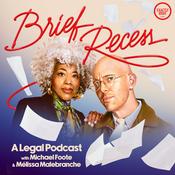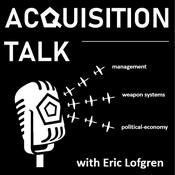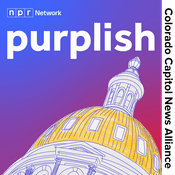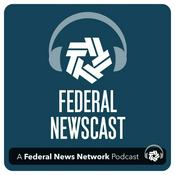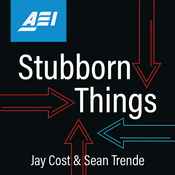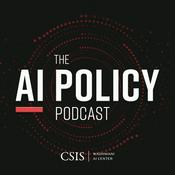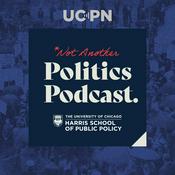335 episodes
- Special Prosecutor Jack Smith gave a closed-door, eight-hour deposition to the House Judiciary Committee that was later—surprisingly—made public. In this episode, hear highlights from his testimony about the investigation into Donald Trump's efforts to overturn the 2020 election, including the fake electors scheme, key prosecutorial decisions, and why members of Congress chose to scrutinize the investigation rather than the alleged crimes. View the show notes on our website at https://congressionaldish.com/cd330-prosecutor-jack-smiths-deposition Please Support Congressional Dish – Quick Links Contribute monthly or a lump sum via PayPal Support Congressional Dish via Patreon (donations per episode) Send Zelle payments to: [email protected] Send Venmo payments to: @Jennifer-Briney Send Cash App payments to: $CongressionalDish or [email protected] Use your bank's online bill pay function to mail contributions to: 5753 Hwy 85 North, Number 4576, Crestview, FL 32536. Please make checks payable to Congressional Dish Thank you for supporting truly independent media!
- In this episode, hear testimony that Republican leadership refused to make part of the official Congressional Record—stories from U.S. citizens who were violently arrested and jailed by agents of the Department of Homeland Security, often while clearly identifying themselves as Americans. This is not rhetoric, speculation, or partisan spin; it is sworn testimony, backed by a Senate investigation, and it raises a terrifying question: if this can happen to them, what stops it from happening to any of us? View the show notes on our website at https://congressionaldish.com/cd329-citizens-detained Please Support Congressional Dish – Quick Links Contribute monthly or a lump sum via PayPal Support Congressional Dish via Patreon (donations per episode) Send Zelle payments to: [email protected] Send Venmo payments to: @Jennifer-Briney Send Cash App payments to: $CongressionalDish or [email protected] Use your bank's online bill pay function to mail contributions to: 5753 Hwy 85 North, Number 4576, Crestview, FL 32536. Please make checks payable to Congressional Dish Thank you for supporting truly independent media!
- In this two-topic episode, we break down what became law in November—including the shutdown deal that reopened the government and the dingleberries that were quietly slipped into it. Then we revisit the hearing on the firing of the CDC Director, focusing on a politicized vaccine advisory committee that has changed its recommendation for the hepatitis B vaccine for newborns. View the show notes on our website at https://congressionaldish.com/cd328-november-laws-vaccine-chaos Please Support Congressional Dish – Quick Links Contribute monthly or a lump sum via PayPal Support Congressional Dish via Patreon (donations per episode) Send Zelle payments to: [email protected] Send Venmo payments to: @Jennifer-Briney Send Cash App payments to: $CongressionalDish or [email protected] Use your bank's online bill pay function to mail contributions to: 5753 Hwy 85 North, Number 4576, Crestview, FL 32536. Please make checks payable to Congressional Dish Thank you for supporting truly independent media!
- Millions of people have trusted 23andMe with their most intimate data—but what happens when a company holding 15 million DNA profiles goes bankrupt? In this episode, you'll hear highlights from bipartisan House and Senate hearings exposing how genetic data can be hacked, shared, retained, and even sold under current U.S. law. Using testimony from lawmakers, legal experts, and 23andMe leaders, this episode uncovers the alarming gaps in federal privacy protections and explains why your genetic information—and even your relatives'—may be far less secure than you think. View the show notes on our website at https://congressionaldish.com/cd327-23andme-and-the-sale-of-your-dna Please Support Congressional Dish – Quick Links Contribute monthly or a lump sum via PayPal Support Congressional Dish via Patreon (donations per episode) Send Zelle payments to: [email protected] Send Venmo payments to: @Jennifer-Briney Send Cash App payments to: $CongressionalDish or [email protected] Use your bank's online bill pay function to mail contributions to: 5753 Hwy 85 North, Number 4576, Crestview, FL 32536. Please make checks payable to Congressional Dish Thank you for supporting truly independent media!
- In this episode, you'll hear what actually happened in Congress during October 2025, a month dominated by a record-breaking shutdown. While the House was on vacation, the Senate enacted mass confirmations of over 100 Trump-aligned nominees—many with extreme views, conflicts of interest, or industry ties—as well as the surprising bipartisan pushback against Trump's global tariff abuses. We also examine the Senate's failed attempt to stop Trump's unauthorized overseas boat strikes. View the show notes on our website at https://congressionaldish.com/cd326-october-2025-slippery-barnacles Please Support Congressional Dish – Quick Links Contribute monthly or a lump sum via PayPal Support Congressional Dish via Patreon (donations per episode) Send Zelle payments to: [email protected] Send Venmo payments to: @Jennifer-Briney Send Cash App payments to: $CongressionalDish or [email protected] Use your bank's online bill pay function to mail contributions to: 5753 Hwy 85 North, Number 4576, Crestview, FL 32536. Please make checks payable to Congressional Dish Thank you for supporting truly independent media!
More Government podcasts
Trending Government podcasts
About Congressional Dish
An independent podcast examining what the U.S. Congress is doing with our money and in our names.
www.congressionaldish.com
Follow @JenBriney on Twitter
Podcast websiteListen to Congressional Dish, Supreme Court Oral Arguments and many other podcasts from around the world with the radio.net app

Get the free radio.net app
- Stations and podcasts to bookmark
- Stream via Wi-Fi or Bluetooth
- Supports Carplay & Android Auto
- Many other app features
Get the free radio.net app
- Stations and podcasts to bookmark
- Stream via Wi-Fi or Bluetooth
- Supports Carplay & Android Auto
- Many other app features


Congressional Dish
Scan code,
download the app,
start listening.
download the app,
start listening.






